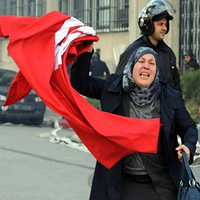When street protests succeeded in putting an end to the 23-year dictatorship of Tunisia's President Zine El Abidine Ben Ali, the world watched in astonishment. Practically no one had anticipated such a rapid turn of events. To be sure, the expectation that despotic Arab regimes will ultimately fall is widespread. But Tunisia, circa 2011, seemed hardly the place or the time for such a dramatic and transformative uprising. If it could happen in Tunisia, the cry went up throughout the Arab world, why not in our countries?
Tunisia's breathtaking Jasmine Revolution brought to mind the collapse of communism in Eastern Europe. In late-1989, the regimes that had ruled European countries east of the Iron Curtain fell in lightning-quick succession. The uprisings toppled like dominoes what had only weeks earlier seemed like all-powerful strongmen, giving way to new democracies and a new era.
The question now is whether the Middle East faces a similar moment in history. Is the least-democratic region in the world about to enter an era of rapid democratization, propelled by the Tunisian revolution?

